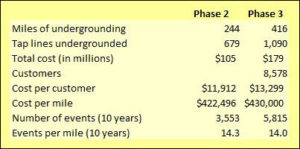
Key metrics for Phase 2 and Phase 3 of Dominion’s Strategic Undergrounding Program
Dominion Energy Virginia has filed for a $73 million rate increase to cover the cost of Phases 2 and 3 of its Strategic Undergrounding Program (SUP). The two phases of the program, designed to limit outages from severe weather events and shorten recovery times, will bury 660 miles of tap lines between them.
The State Corporation Commission (SCC) had permitted a trial of the undergrounding program advocated by Dominion but limited expenditures to $4o million in Phase 2. In the recently approved Grid Transformation and Security Act, however, the General Assembly declared undergrounding to be in the public interest. Now Dominion is filing to recover the full $105 million it has spent on Phase 2 plus another $179 million for Phase 3.
Legally, the law removes the “rebuttable presumption” that the conversion of overhead lines to underground lines will provide local and system-wide benefits, and declares that the costs associated with new underground facilities “are deemed to be reasonably and prudently incurred.” The legislation contains two limits: The cost should not exceed $20,000 per customer, and the average cost per mile should not exceed $750,000 (exclusive of financing costs).
Said Alan W. Bradshaw, director of Dominion’s undergrounding program, in testimony included as part of the filing:
The Company remains firm in its belief that the targeted undergrounding of the most outage prone tap lines will continue to improve the resiliency of the Company’s electric distribution system. The Company believes that a targeted SUP will result in an annual reduction of the total number of outage events and a reduction of repair locations. When outages do occur, it will lead to a reduction in the time required to restore power, particularly as to outages resulting from severe weather events.
According to data provided in the filing, the two undergrounding initiatives would allow Dominion to bury 1,769 tap lines dispersed across the state for a total cost of $284 million. The cost per customer and the cost per mile are well below the limits defined in the legislation.
There are tangible benefits to this investment, but Dominion documents only some of them in the filing. The buried lines accounted for 9,368 outages over the past 10 years — or about $30,3000 per outage avoided. Assuming that a comparable number of outages would have occurred in the future without the undergrounding, how much will the company save in restoration costs? How much outage time will customers save, and what is the economic value of the time saved? Perhaps rate payers will see those numbers in the hearing so they can judge the value of the undergrounding program for themselves.


